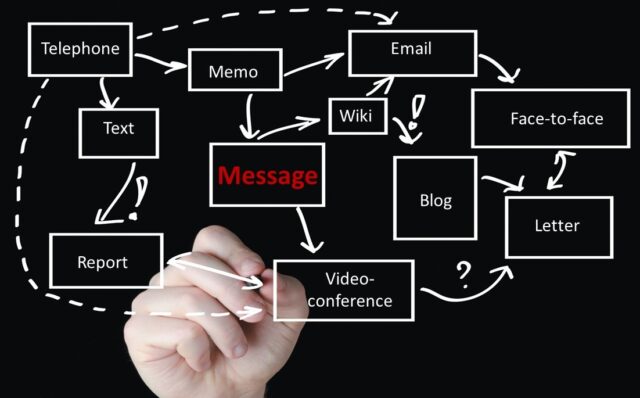
Are you drowning in references, notes, emails, and research drafts? Writing research can be daunting, especially when considering all the different tasks you need to accomplish. But if you and your group can find methods to work more effectively, you can save time, work efficiently, and produce quality work.
But working hard is only one part of the equation. If you want to produce top-notch research, you also have to work smart.
Through the years, great minds collaborating has produced groundbreaking research. And when great minds work towards a common goal, they use project management practices to work effectively. With good project management, you optimise workflow, and in turn—produce better research.
Top 5 Research Project Management Tips
Whether you’re working online doing research or in the lab, it’s important to get your project management process down. For better collaboration or even working well on your own, here are 5 project management tips you can use for research.
#1 – Assign Roles and Establish a Timeline

The great thing about research collaboration is that members have different skills to bring to the table. To maximise the abilities of each member, assign roles to members that best fit their skills.
Assigning roles and tasks to the appropriate members also ensure that it’s done right.
Once everyone has a clear idea of what they need to do, establish a timeline for each section of the research. Having a clear timeline also helps with workflow in cases where someone else’s part depends on the completion of another.
To simplify monitoring collaborators progress, use online project management tools such as Asana or Trello. These tools have features that let you create and assign different tasks with due dates. Project management tools also allow members to comment if they need to leave notes or messages for team members. With just a few clicks, you can monitor each other and the research progress.
#2 – Have Open Channels of Communication

When working with others, keeping open channels for communication is necessary. If you find yourself stuck and in need of assistance, your other members have to be reachable and vice versa. Having ease in talking to one another is also helpful when working together in certain portions of the research. Plus, if you’ve got too many tabs open and you’re easily distracted, your teammates can keep you accountable.
Using messaging tools—like Slack or Discord—keeps you all connected with just a press of a button. Directly message another member, chat as a group, or make smaller groups when working with particular members.
Apart from messaging, you can also use communication tools that have voice and video call features for meetings and discussions. Applications like Zoom and Google Meet have become essential for remote collaboration. For fast-paced, lengthy exchanges, opting for these applications is more convenient.
Communication is an essential part of project management when working with your peers. With better communication, you can work more effectively together.
#3 – Use Online Collaborative Workspaces
Having everything in one place makes things more convenient. By using collaborative workspaces, you don’t need to make multiple files and documents just to put them all together after.
For writing research, online tools like LaTex editor and Google Docs lets multiple users work on one document simultaneously. Seeing how other members write can also help with the overall tone, flow, and cohesiveness of the writing style, reducing later editing.
Another way online collaborative workspaces can help in research project management is that your group can identify and address errors immediately. Apart from working together, collaborative workspaces help monitor other members’ work.
#4 – Hold Regular Meetings

As you progress further into the research, remember to check up on the research progress and other members. In case of changes, delays, or other significant events, everyone should be on the same page.
Having a time and place to address concerns is also necessary to resolve any underlying issues. Other than that, creating a timeline and following it don’t always line up. If adjustments in the schedule are in order, having regular meetings can help quickly identify why and how to go about these changes.
Apart from research progress concerns, be sure to check up on the well-being of your collaborators. According to the American Psychological Association, excessive stress can negatively impact functionality. Working extensively on research can make individuals compromise aspects of a healthy lifestyle like rest, diet, and exercise, leading to excessive stress.
When your collaborators are compromised, so is your research. Managing the well-being of you and your members is also an essential part of research project management.
#5 – Leverage Online Research Tools

Some online tools mentioned earlier in the article can help fine-tune your paper and reduce some of the workload. AI article summarizers, for example, are a great tool to use with your research projects. But there are also project management tools for different aspects of the research process.
After deciding on a hypothesis or research problem, you need to collect sources that support your study and show knowledge gaps. Managing references is one of the biggest challenges in research because of the amount of information one needs to access at any time. Online research tools such as a reference manager can keep all your sources and citations collected and organised.
When you’re done writing the review of related literature, you need to check if your research is free of plagiarism. For this task, you can use online plagiarism checkers like Copyscape, Turnitin, or Duplichecker. All you have to do is copy the text and run it through the plagiarism checker, and the results will show any plagiarised content. It’s a simple, yet effective, online tool to see if your research is plagiarism-free.
Online research tools are great for optimising how you work and can help you manage your time. Since online tools help you effectively accomplish time-consuming tasks, these can play a crucial role in research project management.
Work Smart
The way you work matters. Research project management can have a tremendous impact on the quality of your research. With these top research project management tips, you can optimise your research processes.
With Flowcite, you can tackle different research tasks with an all-in-one platform. Whether it’s building references, collaborative writing, or proofreading, Flowcite’s author services can help you in all areas of your research. Our various tools are here for you to work smart and create groundbreaking research.












